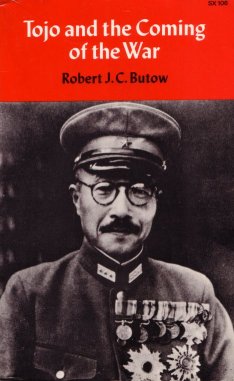
Tojo and the Coming of the War (1961)

The book is about Tojo, although a lot of the book is just about things that were going on concerning the Japanese military whether or not Tojo was involved.
Early in the book the author writes about how the Japanese were concerned about the spread of Chinese and Soviet communism.
He also discusses how the Japanese army in Manchuria tended to operate without the approval or even knowledge of the Japanese cabinet.
The Manchurian crisis was seen by Japan as an act of self-defense.
The book includes a poem by Ogden Nash:
How courteous is the Japanese
He always says, 'Excuse it, please”
He climbs into his neighbor's garden,
And smiles, and says, “I beg your pardon,”
He bows and grins a friendly grin,
And calls his hungry family in;
He grins, and bows a friendly bow;
“So sorry, this my garden now.”
”[Japanese] News media were being subjected more and more to a censorship which allowed only a parroting of the distortions and fictions supplied by military and governmental propaganda agencies.”
On August 15th, 1936, the Emperor was told that the government was going to work towards a “secure position on the Asian continent” in order to make Japan a “stabilizing power”, and that Japan would also move towards the South Seas to for “developing Japanese influence there.”
The book also talks about the Rape of Nanking, and how the Japanese army “...perpetrated in the former Nationalist capital an orgy of murder, rape, and pillage which is almost beyond power of belief.”
The book adds that “Similar atrocities were committed against Chinese outisde the city to a distance of more than sixty miles. Some 57,000 civilian refugees were captured and interned, only to be starved and tortured in captivity and, upon occasion, machine-gunned and bayoneted to death....Japanese embassy officials who entered Nanking with advance army units admitted to an International Committee for the Nanking Safety Zone that the army intended 'to make it bad for Nanking.'”
Which would imply that the raping and killing was not a spontaneous act of brutality on the part of the soldiers, but could have very well been planned in advance.
”Top-secret orders were issued in February 1939, not against the commission of such atrocities, but against revelations concerning them within the home islands.”
The author says that Tojo and his colleagues tended to make decisions without really thinking through the consequences of those decisions. (This seemed to be the general practice of the Japanese military, though; they attacked Pearl Harbor but had no plans for immediate follow-up; they had no real plans for a long-term war; they had no plans on how to deal with the tremendous industrial ability of America, etc.)
The author discusses the economic steps that the US took against Japan before the start of the war, and how Japan considered those steps to be “unfriendly” acts.
The Japanese military also tended to over-estimate its abilities and under-estimate the abilities of the US. In relation to shipping, for example, the Navy figured they would lose about 1 million tons of shipping a year due to the war. In the first year they lost 1.25 million tons, the second, 2.56 million tons; the third 3.48 million tons. They were losing shipping at a rate almost three and-a-half times what they originally estimated.
The book also discusses the fact that the Pearl Harbor attack was a surprise attack when it wasn't meant to be a total surprise, that the Japanese had meant to give the US its formal declaration of war before the attack but things got fouled up and the message didn't get to the US officials in time.
Some of the other problems the military of Japan had was the fact that Germany did not win the war; the Navy thought great warships would win the war, when it was carriers that actually did; neither the Army nor the Navy counted on just how critical control of the air would be in the war. They also counted on a short war, and they were misled by their early victories into thinking that the whole war would go that way.
In addition, there was also a major rivalry between the Army and the Navy that helped ensure a lack of necessary co-operation.
Around February of 1944 school buildings were set aside for use for s torage of military goods, and their yards were converted to vegetable gardens. Some 10,000 “places of amusement” were ordered to be closed; geisha houses were closed, and a reduction in holidays was declared.
Tojo's trial is covered as well as his ultimate fate.
Main Index
Japan main page
Japanese-American Internment Camps index page
Japan and World War II index page
|